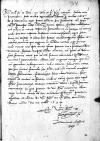Post multos exanclatos labores, per multos casus et per discrimina rerum, perveni tandem huc incolumis, ubi Sigismund I Jagiellon (Zygmunt I) (*1467 – †1548), King of Poland and Grand Duke of Lithuania (1506-1548); Duke of Głogów (Glogau) (1499-1506), Duke of Opava (1501-1506), Governor of Silesia (1504-1506); son of King Kazimierz IV Jagiellon and Elisabeth of Austria
Bona Sforza (*1494 – †1557), Queen of Poland and Grand Duchess of Lithuania (1518-1557); the second wife of Sigismund I Jagiellon; Duchess of Bari and Rossano; daughter of Gian Galeazzo Sforza of Milan and Isabella of Aragon⌊serenissimas maiestatesSigismund I Jagiellon (Zygmunt I) (*1467 – †1548), King of Poland and Grand Duke of Lithuania (1506-1548); Duke of Głogów (Glogau) (1499-1506), Duke of Opava (1501-1506), Governor of Silesia (1504-1506); son of King Kazimierz IV Jagiellon and Elisabeth of Austria
Bona Sforza (*1494 – †1557), Queen of Poland and Grand Duchess of Lithuania (1518-1557); the second wife of Sigismund I Jagiellon; Duchess of Bari and Rossano; daughter of Gian Galeazzo Sforza of Milan and Isabella of Aragon⌋, principes nostros clementissimos, inveni, optima fruentes valetudine, sed aulam et mores reperi sic immutata, ut non possim non mirari, unde hoc tam repente serpserit metamorphosis. Cogor hinc brevi me eripere et cedere huic patriae. Vivant Artucius istic et Catulus, maneant, qui nigrum in candida vertunt, ego huius aulae mores nec ipsa meos ferre poterit, sic a pristino candore describit orig. descrivit⌈describitdescribit orig. descrivit⌉, forsan temporum nostrorum miseria. Non possum non dolere has fortunae vices, quae non nisi futuras calamitates (quas Deus avertat) portendunt; eadem erant The Hungarians ⌊UngarorumThe Hungarians ⌋ vestigia, quae nostri non gravatim subsequuntur. Sed o utinam falsus sim vates! Pro hac hieme firmabo hic pedes, sed ubi vernali tempore arva floruerint, festinanter hinc abire decrevi.
Haec amice ad amicum et fratrem scribere volui, quem scio rerum istic immutatarum statum vicissim dolere. Si quid interea occurrerit, in quo possim Dominationi Vestrae Reverendissimae inservire, illam rogo, iubeat et me ad sua mandata quam libentissime paratum offendet, et eidem Dominationi Vestrae Reverendissimae me ex corde commendo.


 AAWO, AB, D. 67, f. 314v
AAWO, AB, D. 67, f. 314v